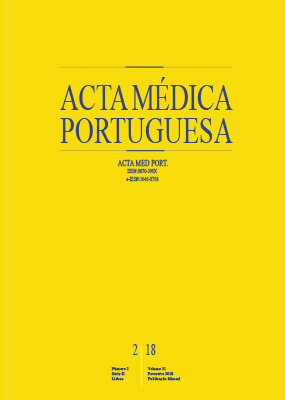Challenges of Ageing in Portugal: Data from the EpiDoC Cohort
DOI:
https://doi.org/10.20344/amp.9817Keywords:
Aging, Comorbidity, Delivery of Health Care, Outcome Assessment (Health Care), Portugal, Quality of LifeAbstract
Introduction: Portuguese adults have a long lifespan, but it is unclear whether they live a healthy life in their final years. We aimed to determine the prevalence of multimorbidity and characterize lifestyle and other health outcomes among older Portuguese adults.
Material and Methods: We performed a cross-sectional evaluation of 2393 adults, aged 65 and older, during the second wave of follow-up of the EpiDoC cohort, a population-based study involving long-term follow-up of a representative sample of the Portuguese population. Subjects completed a structured questionnaire during a telephone interview. Socioeconomic, demographic, lifestyle behaviours, chronic diseases, and health resources consumption were assessed. Cluster analysis was done to identify dietary patterns. Descriptive and analytic analysis was performed to estimate multimorbidity prevalence and its associated factors.
Results: Multimorbidity prevalence among older adults was 78.3%, increased with age strata (72.8% for 65 – 69 years to 83.4% for ≥ 80 years), and was highest in Azores (84.9%) and Alentejo (83.6%). The most common chronic diseases were hypertension (57.3%), rheumatic disease (51.9%), hypercholesterolemia (49.4%), and diabetes (22.7%). Depression symptoms were frequent (11.8%) and highest in the oldest strata. The mean health-related quality of life (EQ-5D-3L) score was 0.59 ± 0.38. Hospitalization in the previous 12 months was reported by 25.8% of individuals. Overall, 66.6% of older adults were physically inactive. ‘Fruit and vegetables dietary pattern’ was followed by 85.4% of individuals; however, regional inequalities were found (69% in Azores). Obesity prevalence was 22.3% overall and was highest among Azoreans (33%).
Conclusion: The high prevalence of multimorbidity, combined with unhealthy lifestyle behaviours, suggests that the elderly population
constitutes a vulnerable group warranting dedicated intervention.
Downloads
Downloads
Published
How to Cite
Issue
Section
License
All the articles published in the AMP are open access and comply with the requirements of funding agencies or academic institutions. The AMP is governed by the terms of the Creative Commons ‘Attribution – Non-Commercial Use - (CC-BY-NC)’ license, regarding the use by third parties.
It is the author’s responsibility to obtain approval for the reproduction of figures, tables, etc. from other publications.
Upon acceptance of an article for publication, the authors will be asked to complete the ICMJE “Copyright Liability and Copyright Sharing Statement “(http://www.actamedicaportuguesa.com/info/AMP-NormasPublicacao.pdf) and the “Declaration of Potential Conflicts of Interest” (http:// www.icmje.org/conflicts-of-interest). An e-mail will be sent to the corresponding author to acknowledge receipt of the manuscript.
After publication, the authors are authorised to make their articles available in repositories of their institutions of origin, as long as they always mention where they were published and according to the Creative Commons license.









